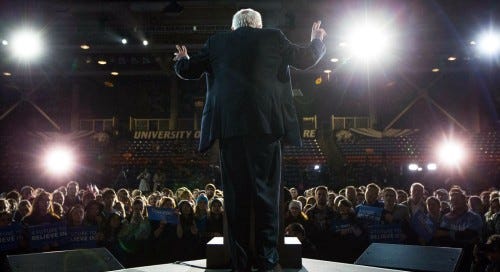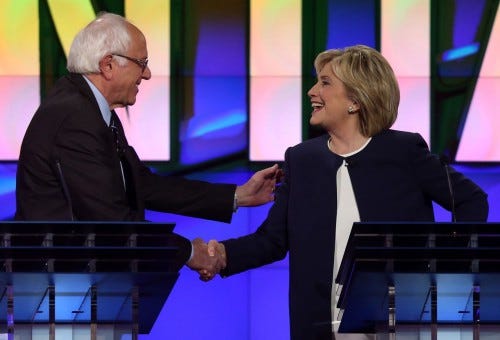Ralph Nader and Bernie Sanders: Political Leverage
It was interesting to see Ralph Nader write an op-ed for The Washington Post last weekend supporting Bernie Sanders’ decision to run as a Democrat. Nader felt compelled to defend the Independent Senator from Vermont from criticism over the political opportunism inherent in his calculated decision to run inside the party as a way to generate attention and as political leverage over the presumptive nominee (still), Hillary Clinton.
The problem is that Sanders gave up the chance for any viable political leverage by precluding the possibility of a third party run before he officially announced he was seeking the Democratic nod.
[O]ne of my proudest political acts was voting for Ralph Nader in the 2000 election. It was the first presidential election I was old enough to vote in; I studied the candidates, I followed the news and the debates. Sure, I preferred Gore to Bush- but I wanted my vote to actually mean something.
So on November 7, I walked into the firehouse of the small Massachusetts town I grew up in, filled out my ballot with a pencil, and turned it in to the own clerk, who then fed it into old wooden voting box by the sign out table. My first vote in a presidential election, and it was for Ralph Nader
We all know how that election turned out. The Bushes stole Florida, stopped the recount at the Supreme Court, and we got 8 years of corruption, scandal, and war.
The 2000 election’s aftermath begat the forging of a longstanding fantasy for the US political establishment. Instead of the Democrats blaming the Bush administration for blatantly cheating and stealing the election, or blaming Al Gore for running a lackluster campaign, they blamed… Nader.
[T]he “logic” goes something like this: if Nader hadn’t been running, all the voters that he got in Florida would have gone over to Gore instead, swinging the election. Of course, this is ridiculous-
There’s no way to know if those voters would have voted for Gore
The election was stolen by faulty voting machines and fraudulent ballots in the first place
The recount was stopped before the federal government could get to the bottom of it
Still, it’s been a popular mythology for both political parties and fodder for declaring voting third party at best futile and at worst dangerous.
[N]owhere has the power of that fear been more apparent this election cycle than in the candidacy of Donald Trump. Trump’s bombastic idiocy was tolerated by the Republican Party establishment for far longer than was necessary precisely because he couldn’t be counted on to not run third party if things didn’t go his way. And now it’s too late to do anything about it, because Trump’s lead is insurmountable and he just announced he’s no longer bound by the promise he made in September to support the eventual nominee.
Sanders, on the other hand, made it clear before he entered the race that he wouldn’t entertain the idea of a third party run, and made it clear why not in an interview with New York Magazine:
If there’s one thing that really bugs Bernie, it is the specter of Nader… Discounting the argument that the two-party system might be a big part of the status quo he so deplores, Sanders slaps down his soup spoon.
“Do you remember Florida?” Sanders half-shouts. “I won’t play the spoiler.”
Well yes, Bernie, we do remember Florida, and more to the point, so does the DNC. It’s why they made sure you wouldn’t go rogue before allowing you to campaign for the Democratic nomination.
[D]ue to the circumstances of closed primaries, Sanders’ campaign is generating high voter registration for the Democrats. These voters will face a choice in November- vote Hillary, third party, or stay home?
Party affiliation makes them more likely to vote in line with that identification. The problem for both Democrats and republicans is that younger voters are increasingly tilting independent:
Sanders’ candidacy is a sheepdog campaign. A sheepdog campaign is one that is designed to gather together the unenthused base supporters of the party and guide them to the establishment candidate. See Kucinich in 2004, or Ron Paul in 2012.
Using the Sanders movement as a party-building exercise makes it more likely that after Sanders is removed from the race, his voters will stay with the Democrats and with Hillary as she tilts to the right after securing the nomination. Sanders’ sheepdogging role has been a success as far as the Democrats are concerned.
And because the Vermont Senator refused to leave the possibility of a third party run open, his political moment, and his leverage, is fading.
[N]ader’s point is well taken, as far as it goes. Sanders is running as a Democrat because he is one at heart and because he knows a third party run will relegate him to a sideshow:
By running as a Democrat, Sanders declined to become a complete political masochist, and he avoided exposing his campaign to immediate annihilation by partisan hacks. Because if he had run as an independent, he would have faced only one question daily in the media, as I did: “Do you see yourself as a spoiler?” The implication being, of course, that he had no chance of winning. His popular agenda would have been totally ignored by a horse-race-obsessed mass media, which would have latched on instead to a narrative in which Sanders was unfairly hurting Hillary Clinton’s chances against whichever Republican wound up with the other major-party nomination, as if any Democrat is automatically entitled to the votes of progressives.
Unfortunately, Nader’s other central point, which is that Sanders’ Democratic run will gain political power and pay dividends for the left, is undercut by the fact that the nominal socialist’s presidential run has nowhere left to go after it runs its course.
If Sanders loses the primaries, that’s it. He’s out of options. The only thing he will have left is to deliver a speech at the Democratic Convention to move his supporters into Clinton’s camp and maybe, just maybe, move a policy position or two of Clinton’s to the left.
The latter’s not likely to happen. After all, he has no leverage.
Update: A friend shared this on facebook. It makes the case for the 2000 election being stolen pretty ironclad.









